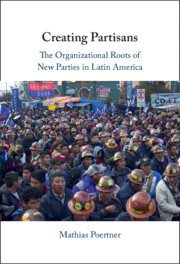Creating Partisans The Organizational Roots of New Parties in Latin America
Langue : Anglais
Auteur : Poertner Mathias

Why are some new political parties successful at creating mass partisanship and engendering stable electoral support, while most fail to take root in society and disappear quickly? Creating Partisans unveils the secrets behind successful political parties, taking a deep dive into the formation and success of new political parties in Latin America. Based on extensive fieldwork and using a multi-method approach, the book explores how different mobilization strategies sway voters to support new parties. While prior studies have focused on the various types of direct appeals parties make to voters, Creating Partisans reveals that it is organizationally mediated appeals ? those that engage voters through locally-based civil society organizations ? that can secure electoral support more effectively and can create lasting partisan attachments. From indigenous organizations to informal sector unions, new types of societal organizations play a critical mediating role in shaping electoral outcomes and fostering long-term partisan loyalties in young democracies.
List of figures; List of tables; Acknowledgments; 1. Introduction: the organizational roots of new parties; 2. Explaining mass support for new parties; Part I. Development of Mobilization Strategies: 3. Mediated appeals through peak associations: MAS in Bolivia; 4. Direct appeals: Alianza PAIS in Ecuador; 5. Mediated appeals through local associations: MORENA in Mexico; Part II. Implications for Mass Support: 6. Mechanisms of electoral support: Bolivia and Ecuador; 7. Resulting electoral support: Mexico; 8. Resulting party identification: Bolivia, Ecuador, and Mexico; 9. Conclusion: New parties, Societal organizations, and democracy; Bibliography.
Mathias Poertner is Assistant Professor of Political Science at the London School of Economics and Political Science. His research on social identities and political participation lies at the intersection of political behavior, comparative politics, and political methodology. Mathias is co-author of Native Bias: Overcoming Discrimination Against Immigrants (2022).
Date de parution : 07-2024
Ouvrage de 250 p.
Thème de Creating Partisans :
© 2024 LAVOISIER S.A.S.



